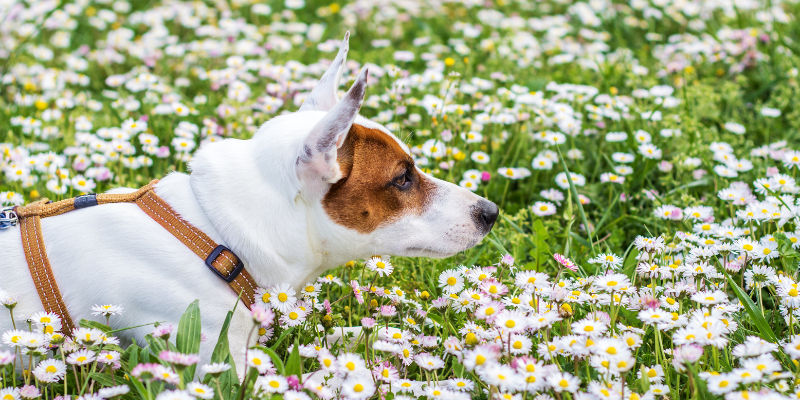
As spring gets underway and the sun starts to shine a little bit more it’s important to think about how to keep your pets safe in the new season.
Allergies
It’s not just us humans that are affected by hay fever, our pets can suffer from seasonal allergies too. While we sniffle and sneeze, dogs and cats tend to scratch due to a condition called allergic dermatitis. If you notice your pet itching more, biting at their paws or any areas of their skin which look inflamed or irritated, speak to your vet for some advice. There are lots of treatments available to help reduce your pet’s discomfort, from tablets and injections to soothing shampoos or medicated wipes. Spring and summer don’t have to be itchy seasons!
Gardening
If you’re planning to get out in the garden for a clear up and planting session, remember that your pets love the garden too! Many bulb plants are toxic if ingested, so if your pet loves to dig and nibble on things they find, these are best avoided. Lilies are particularly poisonous to cats (even licking the pollen from their fur can lead to a serious toxic reaction), so if you have cats or neighbourhood moggies that venture into your garden, please choose another flower.
Thankfully, slug baits containing metalaldehydes (which are incredibly toxic to pets) have been banned for sale in the UK, but this doesn’t mean there aren’t a few old boxes hiding in garden sheds. If you do need to use a pest or weed killer, ensure it is pet friendly or opt for a natural alternative. If your pet ingests any product like this, contact your vet ASAP and give them as much information as possible so they can determine if it’s serious.
Ticks and fleas
While we are finding fleas and ticks to be common year round now, the risk of infestation does increase in summer. Ensure your pet is protected with a parasite prevention medication from your vet. If you do notice any fleas, getting rid of them can be difficult, our guide can give you some helpful tips. Ticks are very nasty parasites which can pass on even nastier diseases, most parasite prevention will either repel ticks or kill them as soon as they bite, but before they have a chance to transfer any pathogens. If you do notice a tick on your pet (or on yourself!), be sure to remove it safely without leaving behind any remnants. A tick twister is the easiest tool to use, this slips under the tick’s body and quickly releases it entirely. Never try to crush, burn, suffocate, or drown a tick – those techniques just don’t work and will likely result in parts of the tick being left behind, or making it regurgitate before it dies which helps it spread disease.
Adders
Adders are the UK’s only venomous snake, they are recognisable by their distinct zig-zag pattern down their backs. They are often found in woodland or rocky coastal areas, hiding away under rocks or logs, or basking in the sun. Adders are not aggressive, most bites happen when people or pets accidentally disturb them or step on them. If you are worried that you are in an adder habitat, keep your dog on a lead and keep an eye on where they step. Whilst painful to humans but rarely serious, bites to our pets can be potentially fatal. If your pet is bitten, call a vet immediately and get them to a nearby practice. Do not tourniquet the wound, you can relieve some of the inflammation with a cool towel. Try to keep your pet’s heartbeat down by remaining calm and picking them up if possible.
Remember that adders are an endangered and protected species, killing or intentionally injuring one is punishable by law. It’s very rare to see one, but if you do happen to spot one of these little reptiles, give them a wide berth and let any other dog walkers know to give them some space too.
Getting lost!
As the sun starts shining our pets are keen to explore! Cats are more likely to venture out on longer adventures which means it’s especially important to get them microchipped and ensure your contact details are up to date. Dogs may be given more freedom to explore off lead so be sure to practice those recall commands and make sure they are chipped and wearing an ID tag.
Call us on 01435 864422 if you have any concerns about your pet.

